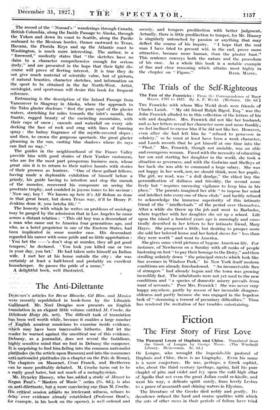The Anti-Dilettante
Dfiaussx's articles for Revue Blanche, Gil Bias, and Musica were .recently republished in book-form by the Librairic Gallimard. Mr. Noel Douglas now presents an English translation in an elegant- little volume entitled M. Croche, the pile:tante yallcr (Os. net). The difficult task of translation has been well worth while, because it enables a large number of English amateur musicians to examine inside evidence, which May have been inaccessible hitherto. But let the reader be warned against the uncritical use of this evidence. Debussy, as a journalist, does not reveal the fastidious, highly sensitive mind that we find. in Debussy the composer. It is surprising to find him falling into the common nationalist platitudes (in the article upon Rameau) and into the commoner anti-nationalist platitudes (in a chapter on the Prix de Rome). The chapters on Massenet, Cesar Franck, and Beethoven can be more ,profitably debated. M. Croehe turns out to be yeally good hater, but not much of a metaphysician. , Mr. Dyaeigy Hus.sey., who has ,added a study of Mozart to Kegan Paul's "Master of. Music 7. ;serial (7s. 6d.), is also an anti-dilettante, but ft, more c,onvincing one than M. Cmche. lis .critical_ session aditits no irrelevant witness, refuses to delay over evidence already established (Professor . Dent's, for example, in his book on the operas), is well ordered and
seemly, and tempers predilection with better judgment. Actually, there is little predilection to temper, for Mr. Hussey is singularly untouched by passion or anything that may deflect the course of his inquiry. "I hope that the real man I have tried to present will, in the end, prove more attractive, because more human, than the plaster bust.'? This sentence conveys both the nature and the procedure of his case. As a whole this book is a notable example of fine and close reasoning which attains most highly in


























 Previous page
Previous page